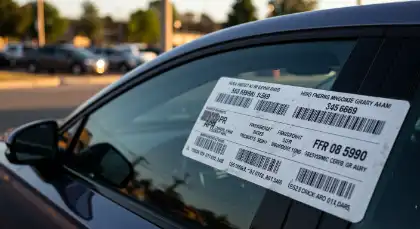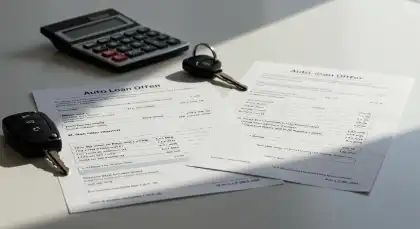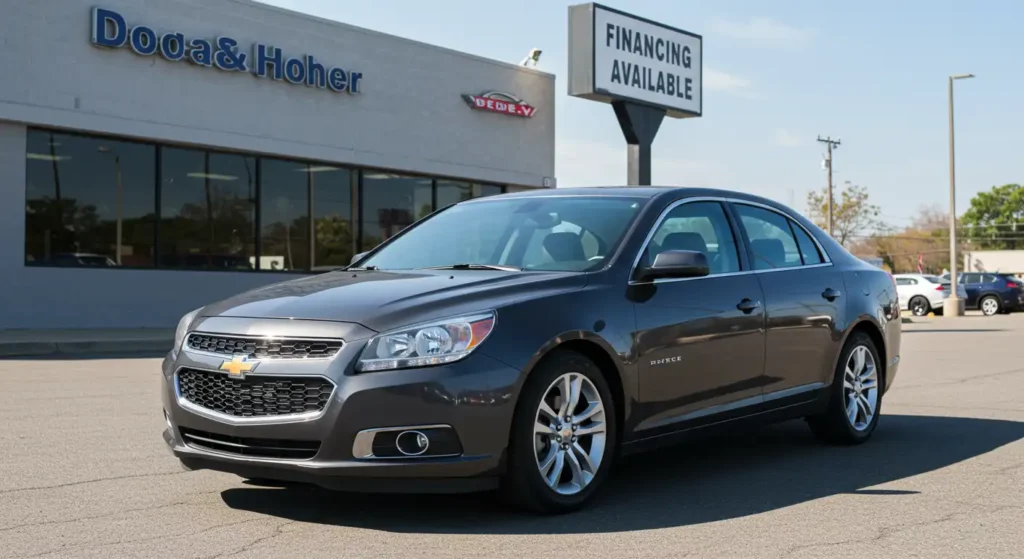Securing the best financing for your used car purchase is just as important as finding the right vehicle. The difference between a smart loan and an unfavorable one can add up to thousands of dollars over the life of your loan. Many buyers focus solely on price and overlook how financing terms—like interest rate, loan duration, and fees—impact their total cost.
Key considerations when financing a used car include:
- Interest rates: Used car loans often carry higher rates compared to new vehicles.
- Credit score impact: Your credit rating plays a major role in qualifying for better terms.
- Loan structure: Down payment size and loan length affect both monthly payments and total interest paid.
- Lender choice: Comparing offers from multiple sources increases your chances of securing the best financing.
Understanding these factors puts you in control, helping you avoid costly mistakes during your used car purchase.
Understanding Financing Options for Used Cars

Used cars usually come with a lower sticker price than new vehicles, but the financing landscape can be more complex. Comparing the cost differences, you’ll find that while you might save thousands on the purchase price, interest rates for used cars are often higher, sometimes double those offered for new models. For example, a late-model used car may cost almost as much as its new counterpart, yet attract a higher rate due to increased lender risk.
When exploring financing options, pay close attention to how interest rates affect your total repayment. A higher rate means you pay significantly more over the life of your loan. This difference is especially pronounced if your credit rating isn’t stellar:
- Excellent credit: Average used-car loan rates hover around 6.8%.
- Poor credit: Rates can exceed 21%, dramatically increasing monthly payments and overall cost.
Your credit rating becomes a gatekeeper for favorable financing terms. Lenders assess your history to determine eligibility and set your interest rate bracket. Maintaining a high score by paying bills on time and keeping debt levels low positions you for the best possible loan offers.
Comparing your loan options side by side allows you to see how interest rates shift based on creditworthiness and vehicle age, giving you direct control over how much you ultimately spend on your used car purchase.
Preparing for Financing Your Used Car Purchase
Maintaining a Good Credit Score
Your credit score plays a significant role in securing favorable financing terms. A higher credit score can lead to:
- Lower interest rates
- More attractive loan offers
- Increased negotiating power with lenders
To maintain or improve your credit score:
- Pay bills on time
- Keep credit card balances low
- Regularly check your credit report for errors
Benefits of Getting Preapproved for a Loan
Getting preapproved for a loan before shopping for a used car provides several advantages:
- Establishes a Budget: Knowing how much you can borrow helps set a realistic budget.
- Strengthens Negotiation Power: Dealerships are more likely to make competitive offers when you have preapproval.
- Simplifies the Buying Process: With financing secured, you can focus on finding the right car without worrying about loan approval.
Preapproval acts as a financial roadmap, ensuring you stay within your means and avoid overextending your budget. It also demonstrates to sellers that you are a serious buyer, potentially leading to better deals and smoother transactions.
Factors That Influence Financing Terms on Used Cars

Role of Down Payment in Reducing Total Interest Paid Over the Life of the Loan
A significant down payment can be a game-changer when financing a used car. By putting more money down up front, you reduce the principal amount that needs to be funded. This reduction not only decreases your monthly payments but also lowers the total interest paid over the life of the loan. For example, if you make a 20% down payment on a $15,000 used car, you’re financing $12,000 instead of $15,000. This smaller loan amount results in less interest accrued, saving you money in the long run.
Impact of Loan Term on Total Interest Paid and Risk Factor Associated with Longer Loans
The term length of your loan is another critical factor. Shorter loan terms typically come with higher monthly payments but result in lower total interest paid. Conversely, longer loan terms have lower monthly payments but increase the total interest paid over time and elevate the risk of being “upside down” on your loan—owing more than the car’s current value. For instance:
- 36-month loan: Higher monthly payments but less overall interest.
- 60-month loan: Lower monthly payments but significantly more interest over time.
Choosing a shorter loan term can save you money and reduce financial risk, making it an essential consideration when understanding how to secure the best financing for your used car purchase.
Shopping Around to Find the Best Loan Offers for Your Used Car Purchase
- Prequalifying with lenders, a strategy that gives you leverage in the car-buying process. When you prequalify, multiple lenders provide tentative offers based on your credit profile without a hard inquiry on your credit report. This allows you to compare rates and terms side by side, helping you spot the best financing deal before setting foot in a dealership.
Benefits of Prequalifying with Multiple Lenders:
- Competitive rates: Lenders know you’re shopping around, which can motivate them to offer better terms.
- Clearer budget planning: You get a realistic sense of what you can afford.
- Stronger negotiating position: Arriving at the dealership with competing offers can lead to additional concessions.
Key Factors When Evaluating Loan Offers:
- Annual Percentage Rate (APR): This is the true cost of borrowing, including interest and most fees. Lower APR means lower total cost.
- Loan Term: Shorter loan durations typically have higher monthly payments but less total interest paid.
- Fees: Watch for origination fees, application charges, or early repayment penalties that can quickly add up.
- Flexibility and Restrictions: Some lenders restrict vehicles by age or mileage; others may offer perks like fast funding or cosigner options.
Comparing these factors across at least three lenders provides a clear picture of your best options. Reading each loan offer closely avoids surprises down the road and ensures your financing truly matches your needs.
Finalizing Your Financing Deal: Negotiating and Budgeting Tips

Walking into the dealership with a preapproved financing offer instantly changes your negotiation power. Sales staff recognize you as a serious buyer with options, minimizing pressure to accept higher dealer-arranged rates or unnecessary extras. With your financing details in hand, it’s easier to stay focused on getting the best price for the car itself, rather than being distracted by complex financing pitches.
Key budget considerations extend far beyond the monthly payment:
- Total Loan Cost: Always calculate the full amount you’ll pay over the life of the loan, not just what fits comfortably month-to-month.
- Insurance: Used cars often cost less to insure than new ones, but premiums can vary widely based on model, age, and your driving history. Get insurance quotes before committing.
- Maintenance Expenses: Older vehicles may need more frequent repairs or part replacements. Set aside funds in your budget for routine maintenance and unexpected repairs.
- Registration and Taxes: Don’t overlook state taxes, registration fees, and any documentation charges that may be due at purchase.
“Negotiating from a position of strength means knowing your numbers—not just your loan terms, but every expected cost tied to owning that vehicle.”
Staying disciplined with these budget considerations ensures you don’t stretch yourself thin or fall victim to common dealership negotiation tactics designed to upsell or obscure true costs. This approach keeps you firmly in control of both the deal and your ongoing financial well-being.
For those buying their first car, these tips become even more crucial as you navigate through this significant financial decision.
Additional Considerations When Securing Financing for a Used Car Purchase
When securing financing for a used car purchase, it is vital to be aware of unnecessary dealer add-ons that can inflate the price of the car and your loan amount. Dealer add-ons such as extended warranties, paint protection, and gap insurance might sound appealing, but they often come at a steep price. Assess if these add-ons are truly necessary or if they can be obtained cheaper elsewhere.
Conducting a thorough vehicle inspection is crucial before finalizing your purchase. A comprehensive inspection by a trusted mechanic can reveal potential issues that could lead to costly repairs down the line. This step helps negotiate a fair price and avoid unexpected maintenance costs.
Setting aside funds for potential maintenance issues post-purchase is another key aspect. Unlike new cars, used vehicles may require immediate attention to certain parts or systems. Budgeting for these expenses ensures you are prepared for any immediate repairs needed and helps maintain the vehicle’s reliability.
Additionally, remember to complete all necessary paperwork, such as the CR-79 form, which is essential for transferring ownership of the vehicle in New York.
By carefully evaluating dealer add-ons, ensuring an in-depth vehicle inspection, setting aside funds for maintenance, and completing all required paperwork, you can make more informed decisions during your used car purchase process. These steps support securing the best financing deal by keeping unforeseen costs in check and maintaining control over your budget.
Conclusion
Taking proactive steps is essential to secure the best financing for your used car purchase. By researching thoroughly, budgeting effectively, and comparing multiple loan offers, you position yourself for the most favorable terms.
Key Actions to Take:
- Research: Understand the financing landscape and your credit score’s impact on interest rates.
- Budgeting: Factor in all costs, including monthly payments, insurance, and maintenance.
- Compare Loan Offers: Prequalify with multiple lenders to identify the best rates and terms.
- Careful preparation and informed choices are your best tools in this process. By staying proactive, you ensure a smooth buying experience and a financially sound decision.

